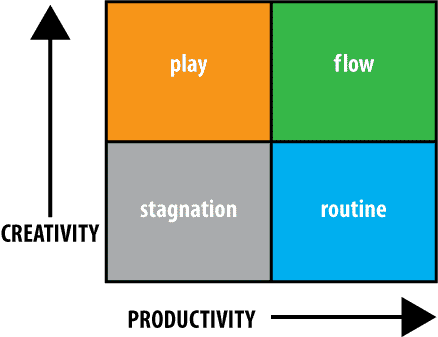How to Handle a Dip in Creativity and Productivity

If you’re a creative person you know how bad it feels to have a dry period.
Perhaps you’re a writer, an artist, a poet, or a journalist, and for the last few days (or weeks) you’ve just not had any good ideas.
Or maybe you’ve had a couple of good ideas, but you’ve been unable to turn them into output.
Here is the list of questions I go through when this happens to me, and my methodology for fixing the situation.
Have you been exercising? When I stop exercising my creative energy drops by probably 50-75%. And the more sedentary I am, the worse the effect.
What have you been eating? Bad food tastes good while you eat it, and then you feel like garbage for hours afterwards. And this effects mental performance as much as anything.
Have you been getting 7-9 hours of sleep? The odds are that if you’ve been missing on the first two, the answer to this third is, "No." Sleep, like exercise, bathes the mind. It keeps it clean and energetic, and ready to produce good things.
What have you been reading? As I’ve written about many times before, one of my primary keys to good output is consuming good input. When I’m reading quality reading about psychology, philosophy, effective management, culture, history, biology, technology, etc., I can barely get through a good chapter before I have 12 ideas that I MUST go and write about.
A methodology
So my new system for dealing with a slow period is very simple. I ask myself these questions just as an academic exercise, because I know I’m going to fail on one or many of them.
But I know that regardless of which I am doing or not doing, the answer will always be the same—do the following:
Fix your diet, starting tomorrow. Don’t get obsessive about it. Reduce your portions if you’re overweight, and eat high quality food. Cut down the garbage like soda, fast food, etc. That’s it.
Do some exercise every weekday. A 20 minute walk, a 20 minute run, whatever. Just some cardio every week day. Add more as you have time or desire.3. Make time for 7-8 hours of sleep each night, and try to take a 20-minute nap after lunch if you can. Sleep is nightly cleaning of the brain; don’t skimp on it.
Get back into your booklist. Make time every day to read at least 30 minutes. Audioreading during commutes, Kindle on the couch, whatever.
I’ve used this methodology multiple times over the last 10 years. It’s never failed to re-spark my creativity and hunger to produce.
Try it and let me know how it works for you.